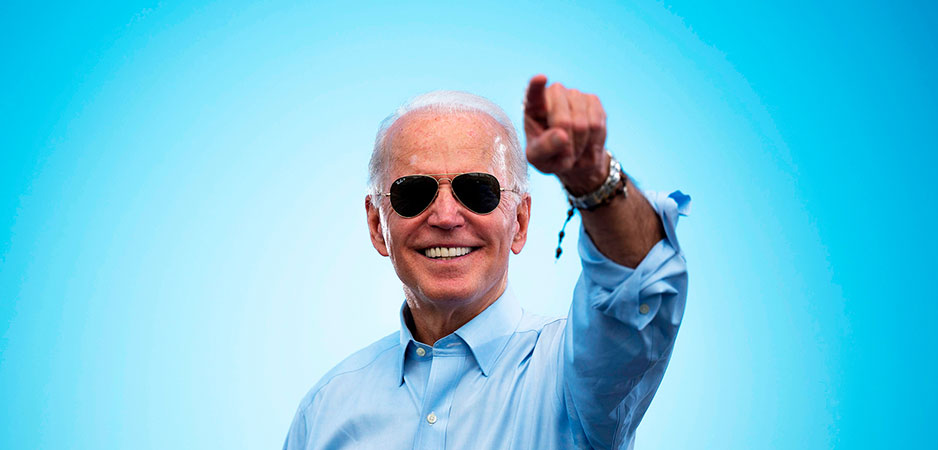In speech after speech, US President-elect Joe Biden has affirmed the basis of his future agenda in no uncertain terms. It consists of a single word and amounts to the kind of religious dogma that requires an effort of belief on the part of the faithful — his voters. The word is “possibilities.”
In his victory speech on Saturday, Biden confessed once again: “I’ve always believed we can define America in one word: possibilities.” Does it matter that equating an existing nation with the open-ended concept of “possibilities” makes no sense, logically, linguistically or even rhetorically? His audience is best advised to treat this as a feeble attempt at political poetry.
The Future of the Semi-Victorious Democratic Party
Biden never tires of explaining “possibilities” as the nation’s ability to achieve whatever it sets out to achieve, his interpretation of the American dream applied not to individuals, but to the nation as a whole. In his closing remarks he returned to his favorite, endlessly repeated cliché about the nation, the idea that “there has never been anything we have not been able to do when we’ve done it together.”
Here is today’s 3D definition:
Never:
The negation of “ever” that serves to deny the existence or even possible existence of an event within a given period of time, a concept essential to the rhetoric of politicians who, in their commitment to an idealized hyperreality, use it to exclude obvious aspects of reality from the public’s consideration.
Contextual Note
Logicians may find it paradoxical that Joe Biden’s thought processes allow him to juxtapose two apparently contradictory concepts. He insists on unrestricted “possibilities” but simultaneously reduces the range of possibility by proposing a litany of things that can “never” happen in America. He has, in other words, excluded those events from the realm of possibility, including the idea that the US may not achieve any of its goals. That is how hyperreality works: It excludes visible reality while supporting the illusion of inclusion.
Biden was born into a world where reality still had a strong claim on people’s lives. In 1942, a war was raging in Europe and the Pacific. Soldiers on the ground were killing other soldiers, unlike the reality of today’s wars, all of which Biden has consistently promoted and supported. Today our drones rather than actual soldiers do the killing, turning death itself into a mere forgotten feature of the hyperreality’s elaborate decor.
We can thus forgive Biden for committing the mistake that no true proponent of hyperreality is permitted to make: the sin of hinting that reality might be a “possible” alternative to hyperreality. That explains why Biden feels the need to appeal to the absurd idea of “never.” He must assert through denial what people in a hyperreal world are expected to take for granted.
A close reading of Biden’s language can prove useful in situating the borderline in his mind between the real and the hyperreal. At one point, Biden says, “You see, I believe in the possibility of this country.” This implies that some people do not believe in it. But what can “the possibility of this country” possibly mean? Has he been reading Michel Houellebecq’s “The Possibility of an Island”? Unlike the French author, who poetically and philosophically imagined that “in the realm of time, there exists the possibility of an island,” Biden more prosaically seems to be saying,” Give me a chance to try some things out, because anything is possible,” without even hinting at what it is he would like to try out.
He then attempts to add some precision: “We’re always looking ahead. Ahead to an America that’s freer and more just. Ahead to an America that creates jobs with dignity and respect. Ahead to an America that cures disease … Ahead to an America that never leaves anyone behind.” He fails to mention the logical corollary of this, that if America is always looking ahead, it is because, contrary to his claim, it has never managed to accomplish any of these goals it set out to achieve in the past.
Another interpretation is possible. He could mean that “looking ahead” is a good enough solution, a proof of virtue. No result is required. In reality, his message is that because none of these goals have been satisfactorily accomplished, it’s now time to act. A cynic might say, “Joe, you’ve been in politics for 45 years and at the highest level for 8 years, why are there no results?” Another cynic might answer that accomplishing these things would impede politicians from having any serious promises to make to get elected.
Biden then offers a trio of clichés that Americans of Biden’s generation never tire of hearing: “an America that never gives up, never gives in,” “a great nation” and, finally, “we are a good people.” This serves as a setup for the patented line he used over and over again in the debates and his stump speeches. The transcript reads: “This is the United States of America. And there has never been anything, never been anything we’ve been able, not able to do when we’ve done it together.” In this version, before catching himself, he nearly repeated his embarrassing Freudian slip when he said at this year’s Democratic National Convention that “there’s never been anything we’ve been able to accomplish when we’ve done it together.” Had Freud heard this repeat performance, it would have jolted the Viennese psychoanalyst to attention.
True to his time-honored vocation of a plagiarist, Biden even quotes Warren Buffett without citing him: “It’s always been a bad bet to bet against America.” This was probably just a sop for his Wall Street donors to reassure them that he won’t try too hard to ensure that America “never leaves anyone behind.”
The majority of Americans deservedly find themselves in a joyful mood after Biden’s defeat of the inveterate liar, cheater and thief who has occupied the White House for the past four years and still managed to get nearly 71 million people to vote for him. With Trump’s lies out of the way, Biden’s electors need to begin listening closely to the new president’s words as well as to examine his deeds.
Historical Note
Joe Biden’s belief in “possibilities” is fraught with deeper levels of ambiguity than mere wishful thinking about doing things better in the future. It implies a vision or philosophy of history that he expects Americans to share with him, a philosophy that most young people are no longer ready to adhere to. It’s the Panglossian idea that US history is the story of one long progress toward greater and greater perfection.
A linguist or philosopher might point out that Biden’s statement, “we can define America in one word: possibilities,” is a truism. It also signifies that the nation has no definition. But the events of history provide a definition, reducing the extent of possibilities. In 1861, it was still possible that the South could end up winning the Civil War, sundering the American nation in two. In 1933, the so-called Business Plot could have overthrown Franklin D. Roosevelt and effectively installed a fascist pro-Nazi government. History decided otherwise.
Most Americans today, and certainly Joe Biden, are happy that those two events never occurred, though we may suspect that many of Donald Trump’s supporters disagree. A separate Confederacy and a fascist US were real historical “possibilities.” And that should tell us that Biden’s celebration of possibilities may have its dark side, one requiring everyone’s vigilance.
Another possible reading of US history points to the systematic closing, rather than the opening of, possibilities. The South lost the Civil War and slavery was abolished. But, with Jim Crow, the US immediately put into place an alternate system that perpetuated racism and the continued marginalization of black Americans. Even after the civil rights movement, new tactics have permitted racism to perdure. The possibility of equality and justice has been effectively countered.
The Business Plot was foiled, but what it aimed at fell into place after World War II with the establishment of a militarized economy controlled by dominant financial and industrial interests and protected by a political class that, with one exception in 1961, has consistently refused to pronounce the dreaded phrase, military-industrial complex. Biden is right. When Americans set their mind to it, they can make any possibility real. But not all possibilities are equal.
*[In the age of Oscar Wilde and Mark Twain, another American wit, the journalist Ambrose Bierce, produced a series of satirical definitions of commonly used terms, throwing light on their hidden meanings in real discourse. Bierce eventually collected and published them as a book, The Devil’s Dictionary, in 1911. We have shamelessly appropriated his title in the interest of continuing his wholesome pedagogical effort to enlighten generations of readers of the news. Read more of The Daily Devil’s Dictionary on Fair Observer.]
The views expressed in this article are the author’s own and do not necessarily reflect Fair Observer’s editorial policy.
Support Fair Observer
We rely on your support for our independence, diversity and quality.
For more than 10 years, Fair Observer has been free, fair and independent. No billionaire owns us, no advertisers control us. We are a reader-supported nonprofit. Unlike many other publications, we keep our content free for readers regardless of where they live or whether they can afford to pay. We have no paywalls and no ads.
In the post-truth era of fake news, echo chambers and filter bubbles, we publish a plurality of perspectives from around the world. Anyone can publish with us, but everyone goes through a rigorous editorial process. So, you get fact-checked, well-reasoned content instead of noise.
We publish 2,500+ voices from 90+ countries. We also conduct education and training programs
on subjects ranging from digital media and journalism to writing and critical thinking. This
doesn’t come cheap. Servers, editors, trainers and web developers cost
money.
Please consider supporting us on a regular basis as a recurring donor or a
sustaining member.
Will you support FO’s journalism?
We rely on your support for our independence, diversity and quality.






